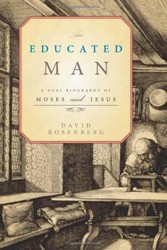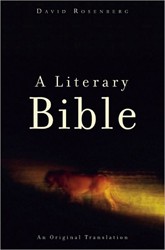David Rosenberg, whose latest books are A Literary Bible: An Original Translation and An Educated Man: A Dual Biography of Moses and Jesus
, will be blogging all week for the Jewish Book Council and MyJewishLearning.
My two new books are both about Jewish writers in times when we like to pretend there were no Jewish writers — just Jewish prophets, priests, and proto-rabbis or “sages.” Even today, it’s fashionable to claim that a writer of the Middle Ages such as Yehuda Halevi is among the first Jewish writers. But I ask you: Is not the Hebrew Bible also Jewish writing? Are not the myriad apocryphal books of Hellenistic times Jewish writing? Is not the Talmud and Midrash?
The answer I most often hear is that writers of all these foundational works of Jewish literature did not identify as writers but, as I said, “sages” — or even, according to a popular trope among Biblical scholars, as pious “invisiblists,” men and women who were so humble they preferred anonymity, so that even their wives (or husbands) didn’t know what they were doing all those long hours up in the attic. Of course, today we are so backward that writers actually expect to make a living from writing. And not only that, but to be recognized as thinkers and invited to lecture and blog, just as I am doing now.
Already I am thinking: two long paragraphs and I haven’t even mentioned the titles of my books. If readers don’t have the titles stamped into their foreheads, they will find something better to do than check my author page at Amazon.com and maybe order a book. And then, when the rent comes due and the account balance hovers near empty, what will I say to my wife? That I was too idealistic to care?
So let me assert, as justification for my newest title, how for Moses or for Jesus there were no old or new testaments, but rather a long history of writers and writing. Their access to this history is so pervasive that their literate educations should not be in question. To ask where and how they got their education is to ask how the Bible was written. And yet the subject we are most absent-minded about today is precisely this one: how and in what writers were the biblical authors themselves educated? It is a historical question, but Jewish history is the proof of revelation itself, as most ironically elucidated in the twentieth century by Franz Rosenzweig, in his The Star of Redemption. And now I’ve already named another book, a guiding inspiration, before my own.
Since we live in an era when history, especially ancient history, seems a quaint subject beside our modern social progress and intellectual self-regard, a lack of Jewish education works to the advantage of our modern Jewish writers. Whatever they may have known, the writers often named as our American Jewish forefathers, Bellow, Roth, and Mailer among them, showed little interest in Jewish history prior to the twentieth century. When it comes to the Hebrew Bible, even modern Israeli authors echo (if they do) biblical “stories” or “text” — which are timeless — rather than flesh and blood biblical writers. The actual biblical writers, in order to be imagined in their living Hebraic culture, require a sense of historical context, and even a love of Jewish history.
And to conclude for now, perhaps I have arrived at the point where the title of my newest book is necessary to sum up this first of three posts to the Visiting Scribe. An Educated Man: A Dual Biography of Moses and Jesus, presents Moses as the core writer-figure of the Torah — and indeed, in his influence, of the entire Bible, including New Testament. Biography is the appropriate approach because it forces us to acknowledge the later biblical writers who transformed the work of Moses into the Torah (and its further elaboration) in Jerusalem. There can be no life of Moses without knowing where “his” words come from, both in his own historical education, in Egypt and in Midian, and in the ancient Hebraic culture that produced so many profound writers we have lost.
In the next post, I want to dig deeper into why I believe a Jewish writer today needs history more than ever. In a review last week of Jeffrey Herf’s new book, Nazi Propaganda in the Arab World, Adam Kirsch writes that the anti-Semitic lies can be “so shameless, so contrary to every evident fact, that they seem to render facts meaningless.” But the Jewish education in history, already embedded in Moses’ Torah, is about the struggle for facts and origins. Even today, I ask in the final chapters of An Educated Manif we can truly call a liberal university education and any of its degrees meaningful — if it remains ignorant of the biblical passion for origins and how our Jewish heritage came to write itself into history. Yet further, can we now, all of us caught up in Western culture, risk forging a new definition of Judeo-Christianity? And can our Jewish writers help us, risking the time off from our success-oriented careers to immerse ourselves in Jewish historical consciousness?
David Rosenberg’s newest books, A Literary Bible: An Original Translation and An Educated Man: A Dual Biography of Moses and Jesus
, are now available. He will be blogging all week for the Jewish Book Council and MyJewishLearning.
The Writer of Writers
The Judeo-Christianity Section
A Travel Tip

